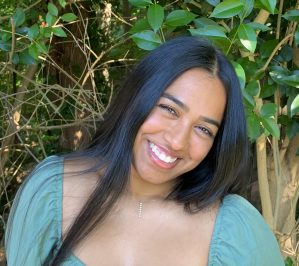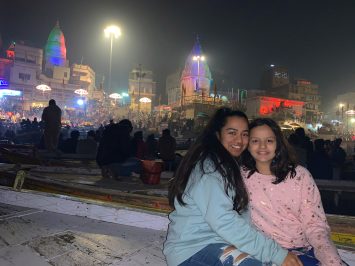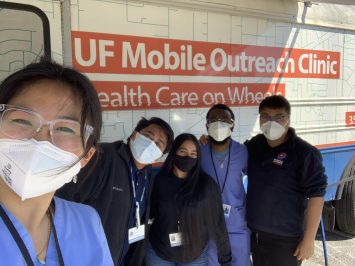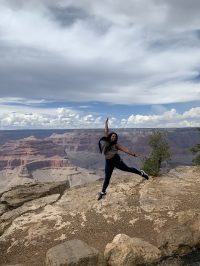Q&A with Anushka Banerjee, MPH Candidate in Global Health
What was your background prior to coming to Gillings?
 I was born and raised in Tampa, Florida, but have extended family in several areas of India. I was privileged enough to be able to visit the country and my family several times. At a young age I saw health disparities affect my family, and while I did not understand the concept at the time, I knew there was injustice in what we had been experiencing.
I was born and raised in Tampa, Florida, but have extended family in several areas of India. I was privileged enough to be able to visit the country and my family several times. At a young age I saw health disparities affect my family, and while I did not understand the concept at the time, I knew there was injustice in what we had been experiencing.
I attended the University of Florida and received my bachelor’s in Public Health, with minors in Anthropology and Health Disparities in Society. As I grew into my academic interests, I realized that the vast number of health disparities that people experience are due to systematic factors perpetuated in our public systems, and that by pursuing public health I would be able to address these underlying issues more directly than through an individual health care profession.
In my last 2.5 years at the University of Florida, I became the Program Operations Coordinator at the UF Mobile Outreach Clinic, worked as a member of the Community Programs department at the Alachua County Health Department (ACHD), and completed an internship with the Gainesville Fire Rescue’s Homeless Outreach Program. I was involved in projects such as the creation of the “What is Public Health?” education series for medical students. The series serves as an introduction to public health and was created in response to learning about the lack of public health content provided in medical school courses. I was also involved in training care coordinators and community members to become Community Health Workers and in creating a partnership with Mobile Outreach Clinic’s BestYou chronic disease management program and the UF Institute of Food and Agricultural Sciences and Family Nutrition Program. At the ACHD, I worked on our Community Health Improvement Plan (CHIP) and Community Health Assessments (CHA) by collaborating with partners across the county.
What are some of your research interests in global health?

On the Ganges River in Varanasi, India awaiting the Ganga Aarti
I am particularly interested in the intersection of Water, Sanitation, and Hygiene (WASH), menstruation, and diarrheal diseases for adolescents. I would like to be part of a collaborative that develops sustainable and culturally accepted solutions to these issues through education, behavior change, and infrastructure. Some other research interests that are equally important to me and are integrated into WASH include emergency and disaster preparedness and response, especially as climate and natural weather events become more frequent and impactful, and children’s advocacy and disease prevention.
Can you tell us about your summer practicum experience with the UNC Water Institute?

Anushka with her University of Florida Mobile Outreach Clinic team
During my practicum experience at the UNC Water Institute, I was able to learn about water and sanitation hygiene (WASH) in health care facilities globally. There are many factors that contribute to issues and solutions in this area of WASH, and the activities and products I completed as a part of this practicum have helped me ease into this area of global health. The key activities that I completed during this practicum included a grey literature sorting, systematic reviews of documents and document extractions, interviews with international WASH in healthcare facility (HCF) professionals, and an analysis of the washinhcf.org website. These activities guided my practicum products, which included a mini study and report of the washinhcf.org website, and a compilation of WASHFIT modules on sanitation related studies.
The mini study on washinhcf.org was put into a brief report style document and was written for the academic audience of WASH in HCF professionals, along with those who are part of the quality assurance team of washinhcf.org. This product was also presented to Lindsay Denny of UNICEF, who is experienced and an integrative member of the washinhcf.org website. The qualitative data collections of this mini study included reviewing several documents and analyzing patterns and frequency of certain phrases and words to understand the accuracy and usability of the website for WASH in HCF professionals. This analysis helped to inform professionals of the implications of using the website and suggested a call to action for website creators to improve some areas of the website to increase the accuracy and feasibility of the washinhcf.org search tool.
The modules included a summary of each intervention or study, the findings and outcomes, and any other information that was important to note about the intervention. The modules also included a visual of where each intervention was conducted, the details of the area, which included type of healthcare facility, geographic makeup (urban or rural), and included icons to symbolize what WASH components were included in the intervention. These were all included specifically and with intention to make the content digestible and a quick read for our audience, who may run across thousands of interventions or proposals a day when deciding on interventions or studies to support.
What has been a highlight of your time at Gillings so far?
I feel truly lucky to be here at Gillings learning about the public health field, networking with professionals across sectors, and working on the things that I find interesting and am passionate about. There are several positives of spending the beginning of my professional time at Gillings, but the highlight for me is the connectedness and warmth of the people and networks surrounding me.
From the peers I have grown so close to in my Global Health cohort (shout out to them!), to the professors who have encouraged me and taken our feedback as a group strongly, and the people I work with now at the UNC Water Institute, I have always felt included and accepted in this space of continuous learning and growth. The people you are surrounded by can influence your perspectives, and in my case, the community at Gillings has always fostered positivity, encouragement, and friendship, which has absolutely been the highlight of my time here at Gillings thus far.
When not studying or working, how do you like to spend your free time?

Trip to the Grand Canyon National Park, summer 2022
I love to travel, whether it be on a road trip, to a beach town, or exploring a new city overseas with my friends and family. So far, I have been to seven countries outside of the USA (with India, United Arab Emirates, Switzerland, and Italy being some of my favorites), and 17 states within the USA. My goal is to increase that number after graduating!
I am a foodie and enjoy trying new cuisines and restaurants in general. Experiencing different cuisines helps me immerse myself into new cultures, and at the same time shows me the similarities between them. Lastly, I love my plants and enjoy taking care of my little home/apartment gardens. One day I hope I’ll have my own backyard garden or sunroom with my plants, inspired by the ecosystem (yes, it really is that big) that my parents have in their backyard.
